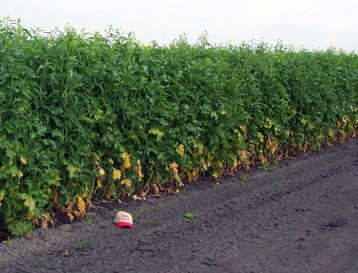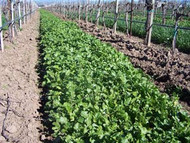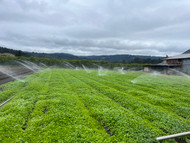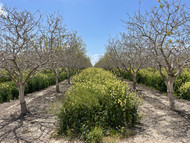Categories
Categories
- Home
- Cover Crops Seed
- Kodiak Mustard
Product Description
Kodiak Mustard (Brassica juncea)
For quantities over 500 lbs. (more than 10 bags of 50 pounds) please contact us by phone at 800 253 7346 or click here for a price quote and delivery options.
Kodiak Mustard is very unique cover crop. Kodiak contains very high levels of glucosynolates, that will break down to form thiocyanates that can control nematodes and organisms which cause soil born diseases.
Kodiak is not a mix or a blend it is all Brassica juncea, the species that has the correct type of glucosinolate to kill disease causing organisms. When incorporated into the the soil, the green tissues will release volatile compounds, allyl isothiocyanates as a metabolite from the reaction between 2 propenyl glucosinolate and myrosinase.
Kodiak has a higher concentration (more per gram of plant tissue) of glucosinolates and produces more plant biomass that previous varieties. Kodiak's organic matter breaks faster compared to standard cover crops.
Kodiak can cycle large amounts nutrients so that your save your residual nitrogen. Kodiak also improves water penetration and suppresses weeds while it grows.
When you are ready to incorporate Kodiak into your soil, chop the green cover crop as fine a possible and then disk into the soil as soon as possible. Kodiak can be incorporated at any green stage of its growth, but the larger you allow it to grow the more total glucosinolate yield you will get -which will max out when the plants begin to go into a reproductive state. Allow a minimum of two weeks after you incorporate Kodiak before planting a new crop.
The amazing mustard is a plant that grows well as winter turns to spring and it adds so much to the soil in the end it reduces pesticide use by harboring beneficial insects and it also adds amazing organic material to the soil.
15 lbs. per acre, 1/4 inch deep into a moist firm seed bed
Kodiak can be planted in year round in mild climates with the best time being in the fall. In colder climates in can be planted in the fall for a cover crop that will winter kill or plant in the spring for a traditional method.
Seed production of Kodiak are is restricted in accordance with the Plant Variety Protection Act.
 Loading... Please wait...
Loading... Please wait... 









